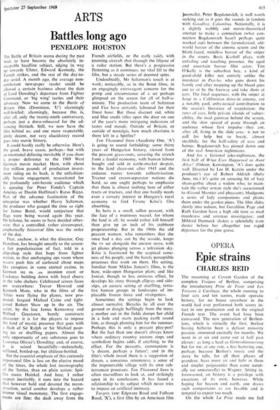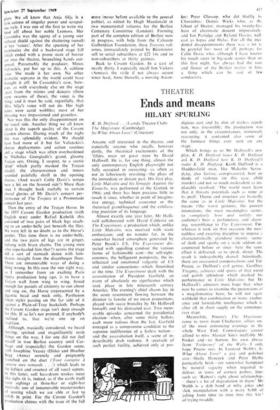OPERA
Epic strains
CHARLES REID
The mounting at Covent Garden of the complete Trojans of Berlioz, comprising the introductory Prise de Troie and Les Troyens a Carthage, the whole running to four acts and ten scenes, made operatic history, for no house anywhere in the world had ever performed both scores in- tact in one production and in the original French text. The event had long been canvassed. The new generation of Berlioz- ians, which is virtually the first, Berlioz having hitherto been a defiant minority passion, simmered excitedly for months. We went in at six and came out at half past eleven : as long a haul as Giitterdiimmerung but for me, at any rate, a less battering one, perhaps because Berlioz's music and the story he tells, for all their phases of grandeur, have more air and light in them and simpler poignancies than came natur- ally (or unnaturally) to Wagner. Sitting in, forewarned, on history is a privilege with exactions of its own, however. While hoping for heaven and earth, one draws such comparisons as are feasible and is tempted to expect too much.
On the whole La Prise made me feel glum. We all know that Anja Silja is a lyric actress of singular power and scrupul- ous style. I was one of the first to write my head off about her noble Leonora. Her Cassandra was the agony of a young seer without shield against the shattering tumult" of her 'voices'. After the spurning of her prophecies she did a backward stage fall rich ended with a prone stare of horror out into the theatre, beseeching hands out- spread. Presumably the producer, Minos Volanakis, put her up to this. A sublime coup. She made it her own. No other dramatic soprano in the world could have brought it off. In Cassandra's case, how- o'er. as with everybody else on the stage apart from the mimes and dancers (there were swarms of these), the voice is the thing: and it must be said, regretfully, that Miss Silja's voice will not do. Her high notes were acrid wobbles; most of her phrasing was impassioned and graceless. Nor was this the only disappointment on the vocal side. Another thing we all know about is the superb quality of the Covent Garden chorus. During much of the night this was splendidly evident. We should have had more of it but for Volanakis's chorus deployments and action routines and a stage which was often overburdened by Nicholas Georgiadis's grand, gloomy Trojan sets. Owing, I suspect, to a scenic 'drop' which partly masked the Trojan .itadel, the choruswomen and tenors sounded painfully shrill in the opening .horns. (And wasn't Colin Davis's tempo sere a bit on the fevered side?) More than ,ace I thought back ruefully to certain .horal glories of Mr Davis's concert per- ormance of The Trojans at a Promenade concert last year.
Then the entry of the Trojan Horse. In the 1957 Covent Garden production (with English text) under Rafael Kubelik this consisted of two pairs of black legs reach- ing to an under-belly just beneath the flies. We were left in no doubt as to the Horse's gender. This time there is no under-belly, and the two pairs of legs are in ginger, behung with brass chains. The young men who rope-hauled him (her?) across the stage did a sort of stomach dance with loin- thrusts straight from the discotheque floor. There are innumerable ways of doing a thing wrong. In this case the one right way, as I remember from an exalting Paris Opera production long ago, is to have a Trojan wall from wing to wing, broad enough for parcels of citizenry to run about and sing on, the Horse (represented by a gigantic head and neck only, Parthenon frieze style) passing on the far side of it against a Plain-of-Troy backcloth. Perhaps the Covent Garden stage isn't deep enough for this. If so let's not pretend, if anybody's inclined to, that we're one up on tradition.
Although, musically considered, we heard moving, spirited and magnificently eerie things on the way, I for one did not feel myself in true Berlioz country until Car- thage and (especially) the Garden scene, with Josephine Veasey (Dido) and Heather Begg (Anna) serenely and poignantly launched on the duet ('Tout conspire a taincre mes remords . . .') which leads to the loftiest and sweetest of all vocal septets. In this latter, soft bass-drum strokes recur like sighs (it is, indeed, as if the earth itself were sighing) at three-bar or eight-bar intervals: one of innumerable masterstrokes of scoring which we are able at last to relish in print. For the Covent Gardeni production chimes with the issue of the full score (never before available to the general public), as edited by Hugh Macdonald in two monumental volumes for the Berlioz Centenary Committee (London). Forming part of the complete edition of Berlioz now in progress, with help from the Calouste Gulbenkian Foundation, these Troyens vol- umes, immaculately printed by Barenrieter sell to serial subscribers at f22 I4s and to non-subscribers at thirty guineas.
Back to Covent Garden. In a cast of nearly thirty, I especially recall Jon Vickers (Aeneas), the virile if not always secure tenor lead; Anne Howells, a moving Ascan-
ius; Peter Glossop. who did bluffly b∎ !Choroebus; Dennis Wicks who, as the Ghost of Hector, managed his twenty-fist. bars of chromatic descent impressively. and Ian Partidge and Ryland Davies, well- cast as lopas and Hylas. For all the inci- dental disappointments there was a lot tc be grateful for: most of all, perhaps, tot Colin Davis who, although 1 have known his touch surer in big-scale scores than on this first night, has always had the root and flower of the Berlioz matter in him. a thing which can be said of few conductors.







































 Previous page
Previous page